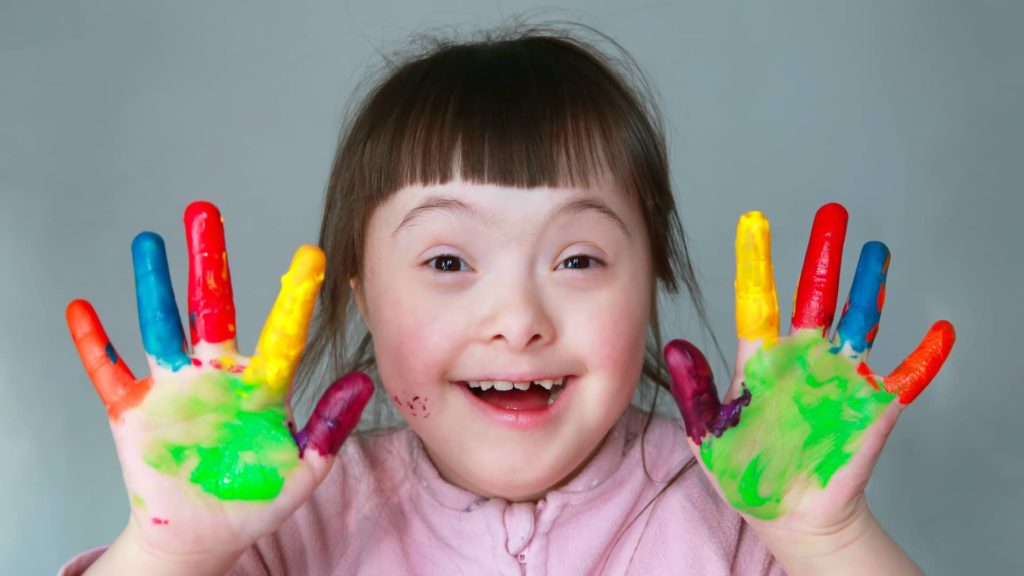Down syndrome is a chromosomal condition caused by the presence of all or part of an extra 21st chromosome. It is named after John Langdon Down, the British physician who described the syndrome in 1866. The condition was identified as a chromosome 21 trisomy by Jérôme Lejeune in 1959.
In every cell in the human body there is a nucleus, where genetic material is stored in genes. Genes carry the codes responsible for all of our inherited traits and are grouped along rod-like structures called chromosomes. In traditionally-developed individuals, each cell contains 23 pairs of chromosomes, half of which are inherited from each parent. Down syndrome occurs when an individual has a full or partial extra copy of chromosome 21.
Down syndrome can affect a child’s learning ability, their physical development and can come with a range of health and developmental challenges.

There are three types of Down syndrome: Trisomy 21 (Nondisjunction), Translocation and Mosaicism.
This is the most common cause of Down syndrome. Trisomy 21 results in an embryo with three copies of chromosome 21 instead of the usual two. Prior to or at conception, a pair of 21st chromosomes in either the sperm or the egg fails to separate. As the embryo develops, the extra chromosome is replicated in every cell of the body. This type of Down syndrome accounts for 95% of cases.
In translocation – which accounts for about 4% of cases of Down syndrome – the total number of chromosomes in the cells remains 46; however, an additional full or partial copy of chromosome 21 attaches to another chromosome, usually chromosome 14. The presence of the extra full or partial chromosome 21 causes the characteristics of Down syndrome.
Mosaicism (or Mosaic Down syndrome) is diagnosed when there is a mixture of two types of cells, some containing the usual 46 chromosomes and some containing 47. Those cells with 47 chromosomes contain an extra chromosome 21. Mosaicism is the least common form of Down syndrome and accounts for only about 1% of all cases of Down syndrome. Research has indicated that individuals with mosaic Down syndrome may have fewer characteristics of Down syndrome than those with other types of Down syndrome. However, broad generalizations are not possible due to the wide range of abilities people with Down syndrome possess.
Regardless of the type of Down syndrome a person may have, all people with Down syndrome have an extra, critical portion of chromosome 21 present in all or some of their cells. This additional genetic material alters the course of development and causes the characteristics associated with Down syndrome.

The most important thing to note is that Down syndrome is just a part of someone. It does not define them. People with Down syndrome are people first and foremost and deserve the same respect and treatment that you would give any other person.
The preferred language to use when referring to someone with Down syndrome is “a person with Down syndrome” rather than “a Down syndrome person”.
Down syndrome is not a sickness or a disease, it is a genetic disorder or chromosomal anomaly that occurs at the time of conception.
Every person with Down syndrome is unique with their own talents, abilities, thoughts and interests and like everybody else they have their own strengths and weaknesses.
Children with Down syndrome can contribute greatly to their families and wider communities provided they are given the right supports, services and opportunities to enable them to reach their full potential.
Our KDSF Center needs your help. We are only able to collect about 18% of what we need to keep the center running. The difference is made through generous donations and fundraising activities organised by the Kiwanis Club of Klang and sponsorship from the public.
Stay updated and join the Kiwanis Malaysia Mailing List
28 Jalan Kampar
41300 Klang
Selangor
Contact Us
Tel: +603 3342 8259
© 2024 Kiwanis Club of Klang. All rights reserved.